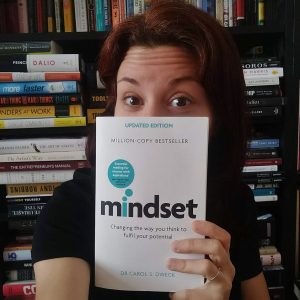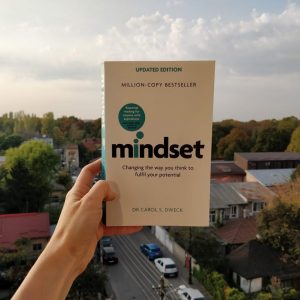Mindset: how to change the way we think [best books read in 2018]
Oct 19, 2018 | Posted by Cristina in Newsletters
 As 2018 is getting closer to its end (we’re at 80% / 10 weeks left), I’ll dedicate the next Friday emails to the best books read throughout the year. Please note that these are NOT books launched in 2018 – if that’s what you’re looking for, sorry to disappoint you. I don’t usually read books that are new and “trending”, unless they’re written by authors whose work I’m already familiar with. Instead, these are just some thoughts about the books that I learned most from this year and I want to share them with you.
As 2018 is getting closer to its end (we’re at 80% / 10 weeks left), I’ll dedicate the next Friday emails to the best books read throughout the year. Please note that these are NOT books launched in 2018 – if that’s what you’re looking for, sorry to disappoint you. I don’t usually read books that are new and “trending”, unless they’re written by authors whose work I’m already familiar with. Instead, these are just some thoughts about the books that I learned most from this year and I want to share them with you.
In the past years, I postponed reading books that are highly recommended by famous people. Because of the high expectations built by others, I’m always afraid that I’ll end up disappointed. I’d also rather risk with more obscure books – how will I stand out and think differently if I’m reading what everyone else is reading? (well, perhaps I’m wrong and everything’s already been said, now it’s just recycled and built upon? anyways. I digressed.)
I’m glad I gave a chance to the book I’m talking about this Friday: “Mindset” by Carol Dweck, a Stanford University psychologist, who published this over a decade ago. Since then, her work’s gotten extremely popular and was praised by Bill Gates, Tony Robbins, Satya Nadella, Jack Dorsey – just to name a few of the big names who swear by it.
The basic idea of this book is that people have two mindsets that play a crucial role in their evolution:
1. There are those with a “fixed” mindset, who believe that they were born with certain abilities – talent, IQ, creativity, and there’s nothing they can do to change that – at least not in a meaningful way. They’ll focus on the outcome instead of improving the process. These are the ones who usually blame failure on external factors, such as bad luck or genetics. They’re always looking for approval / ways to prove that they’re better, and believe that imperfections are shameful. This mindset is rooted in childhood, when parents tell their kids that “they’re great / smart / talented” instead of praising their efforts.
2. And then there are those with a “growth” mindset, who believe that our abilities can be developed and expanded through learning, effort and deliberate practice. They actually enjoy struggle, pain and challenges, and see them as signals that they’re growing and evolving.
 “Mindset” sets the foundation of a healthy monologue. It can help us rethink certain beliefs, most of them unconsciously adopted from the environment we grew up in, and build courage to thrive.
“Mindset” sets the foundation of a healthy monologue. It can help us rethink certain beliefs, most of them unconsciously adopted from the environment we grew up in, and build courage to thrive.
Of course, the idea that lies at the core of “Mindset” isn’t new at all. We all know, at least instinctively, that our attitude is everything and people have to work hard to build a set of skills and strengths.
What’s new in this book is that it’s based on lots of research and science-backed cases that can help people to shift their mindset. You will also question yourself and perhaps realize that you have a fixed mindset in some areas, and growth one in others.
Carol Dweck dedicated separate chapters to specific cases that prove the same idea, but in different fields: sports, business, relationships, parenting, school. My advice? Skip the chapters that don’t currently apply to you, but do read the cases in the ones that do, in order to make sure you internalize all the lessons from this book.
Satya Nadella, Microsoft’s CEO, incorporated Dweck’s perspective and steered the company’s culture to constantly refresh and renew itself. Jack Dorsey, Twitter’s CEO and co-founder, handed out copies of this book to the company’s executive retreat. Bill Gates says that it’s just as relevant for business people as it is for parents who want to raise their kids to thrive on challenge. (more quotes here)
If you want to dig even deeper into the subject, read this book together with:
- Malcolm Gladwell’s “Outliers” – this is the book that popularized the rule of 10,000 hours needed to master a skill and succeed.
- Angela Duckworth’s “Grit” – about the role played by mental toughness and perseverance in our success.
- The 10,000 hours theory isn’t enough to gain expertise in any area, so Anders Ericsson came with the deliberate practice theory. In “Peak“, his well-researched and science-backed book, he breaks the myths about how people acquire new abilities. “The Sports Gene” by David Epstein, Daniel Coyle’s “The Talent Code” and “Talent is Overrated“, by Geoff Colvin, go even deeper into the subject of nurture vs nature – what’s innate and and how much it’s obsessive training.
And since I’m always looking for counter-arguments as well, to make sure I have a broader perspective with all its grey shades, here’s an article that points us towards the potential biases in Carol Dweck’s book, and says that “the popular prejudice that people who fail just weren’t trying hard enough is both wrong and harmful”.
Have you read “Mindset“? If yes, did you find it helpful?
P.S. this article was first sent to our mailing list. If you enjoyed it, please subscribe here.